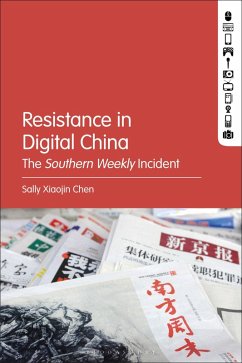By investigating the Southern Weekly Incident, in which censorship of the prominent Chinese newspaper Southern Weekly triggered mass online contention in Chinese society, Resistance in Digital China examines how Chinese people engage in resistance on digital networks whilst cautiously safeguarding their life under authoritarian rule.
Chen's in-depth analysis of the Southern Weekly Incident ties together overlapping debates in internet studies, Chinese studies, social movement studies, political communication, and cultural studies to discuss issues of civic connectivity, emotions, embodiment, and the construction of a public sphere in digital China. Resistance in Digital China demonstrates a valuable methodology for conducting in-depth empirical examination of an act of resistance in order to explore political, cultural, and sociological meanings of Chinese people's resistance within party limits.
Fruitfully combining 45 interviews with key players in the Southern Weekly Incident with largely Western-based communications theory, Chen develops an understanding of the ongoing formation of the Chinese public sphere as elite-led and emotional, at once invoked and rejected by Chinese citizens.
Chen's in-depth analysis of the Southern Weekly Incident ties together overlapping debates in internet studies, Chinese studies, social movement studies, political communication, and cultural studies to discuss issues of civic connectivity, emotions, embodiment, and the construction of a public sphere in digital China. Resistance in Digital China demonstrates a valuable methodology for conducting in-depth empirical examination of an act of resistance in order to explore political, cultural, and sociological meanings of Chinese people's resistance within party limits.
Fruitfully combining 45 interviews with key players in the Southern Weekly Incident with largely Western-based communications theory, Chen develops an understanding of the ongoing formation of the Chinese public sphere as elite-led and emotional, at once invoked and rejected by Chinese citizens.

